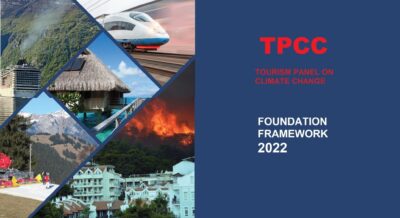TPCC’s Horizon Papers are leading-edge think pieces, to stimulate critical exchanges at the intersection of climate change and tourism. They are commissioned by recognized experts in the field and peer-reviewed. They can be downloaded in full from TPCC.info/downloads/.
The TPCC is an independent and impartial initiative designed to support tourism’s transition to net-zero emissions and climate-resilient tourism development. It was created by the Saudi Arabia-led Sustainable Tourism Global Center (STGC.
TPCC’s first two Horizon Papers are:
1 ‘Aviation Emissions – Sustainable Tourism’s Achilles’ Heel’
Chris Lyle, Founder of Air Transport Economics, reviews recent major studies on the feasibility, contribution, and related policy frameworks of measures that seek to mitigate air transport’s greenhouse gas emissions.
The Paper addresses the collective limited capacity of those measures to achieve the Paris Agreement goals; considers “paths forward and ‘deep dives’” into critical aspects of aviation emissions mitigation. It lays out some key points of consideration for policymakers -noting that the game-changing driver will be new aircraft power sources – particularly Sustainable Aviation Fuel (SAF). It concludes that new thinking is urgently required, suggesting that the tourism sector needs to “get more directly involved” in the decarbonization of aviation lest the industry becomes “a distressed or even stranded asset”.
2 ‘Climate-related Financial Risk Disclosure for Tourism Businesses
Bijan Khazai and his colleagues at Risklayer GmbH review the G20’s Task Force on Climate-related Financial Disclosures (TCFD), noting that increasing numbers of investors are asking tourism organizations about the implications of climate change on their long-term financial performance and suggesting that this will only intensify going forward.
The Paper looks at mainstream climate risk assessment decision support tools in tourism (“largely ill-suited”) and proposes a financial risk disclosure tool that could be useful for the tourism sector in TCFD compliance.
Both Horizon Papers can be downloaded in full from TPCC.info/downloads/
TPCC unveiled at COP27
The Executive Board of the TPCC presented their ‘Foundation Framework’, on November 10, during the UN Climate Change Conference (COP27) in Sharm El-Sheikh, Egypt.
GOT NEWS? click here
Google News, Bing News, Yahoo News, 200+ publications
Created by the Saudi Arabia-led Sustainable Tourism Global Center (STGC) — the world’s first multi-country, a multi-stakeholder global coalition to drive the travel & tourism sector’s transition to net zero — the TPCC represents a new era of global collaboration across academia, business, and civil society.
Inspired by the Intergovernmental Panel on Climate Change (IPCC), the TPCC’s mission is “to inform and rapidly advance science-based climate action across the global tourism system in support of the goals of the Paris Climate Agreement”.
The solutions-oriented TPCC brings together more than 60 leading experts in tourism and sustainability from more than 30 countries to systematically review, analyze, and distill climate change-related science to support and accelerate climate action throughout the travel & tourism sector.
In addition to commissioning, curating, and publishing ‘Horizon Papers’, the TPCC is also charged with delivering:
- The first Science Assessment of tourism and climate change-relevant knowledge in more than 15 years on emission trends, climate impacts, and solutions for mitigation and adaptation to support climate-resilient tourism development globally, regionally, and nationally.
- A climate action Stock Take, using a new set of peer-reviewed and open-source indicators that track key connections between climate change and tourism, including progress on sector commitments in support of Paris Agreement goals.
Co-ordinating the TPCC’s activities is a three-member Executive Board, which has wide-ranging expertise at the intersection of tourism, climate change, and sustainability.
- Professor Daniel Scott — Professor and Research Chair in Climate & Society, University of Waterloo (Canada); Contributing author and reviewer for the Third, Fourth and Fifth IPCC Assessment Reports and Special Report on 1.5°
- Professor Susanne Becken — Professor of Sustainable Tourism, Griffith University (Australia) and the University of Surrey (UK); Winner of UNWTO’s Ulysses Prize; Contributing author to the Fourth and Fifth IPCC Assessment Reports
- Professor Geoffrey Lipman — Envoy for STGC; former Assistant Secretary General UNWTO; former Executive Director IATA; current President SUNx Malta; Co-author of books on Green Growth & Travelism & EIU Studies on Air Transport.
About the Tourism Panel on Climate Change (TPCC)
The Tourism Panel on Climate Change (TPCC) is a neutral body of more than 60 tourism and climate scientists and experts who will provide a current-state assessment of the sector and objective metrics to public and private sector decision-makers worldwide. It will produce regular assessments in line with the UNFCCC COP programs and the Intergovernmental Panel on Climate Change.
Contact: Secretariat@tpcc.info
About the Sustainable Tourism Global Center (STGC)
The Sustainable Tourism Global Center (STGC) is the world’s first multi-country, a multi-stakeholder global coalition that will lead, accelerate, and track the tourism industry’s transition to net-zero emissions, as well as drive action to protect nature and support communities. It will enable the transition while delivering knowledge, tools, financing mechanisms, and innovation stimulation into the tourism sector.
The STGC was announced by His Royal Highness Crown Prince Mohammed Bin Salman during the Saudi Green Initiative in October 2021 in Riyadh, Saudi Arabia. His Excellency Ahmed Al-Khateeb, Minister of Tourism for Saudi Arabia then led a panel discussion during COP26 (November 2021) in Glasgow, United Kingdom, to elaborate on how the Center will deliver on its mandate with founding country representatives and experts from partner international organizations.







